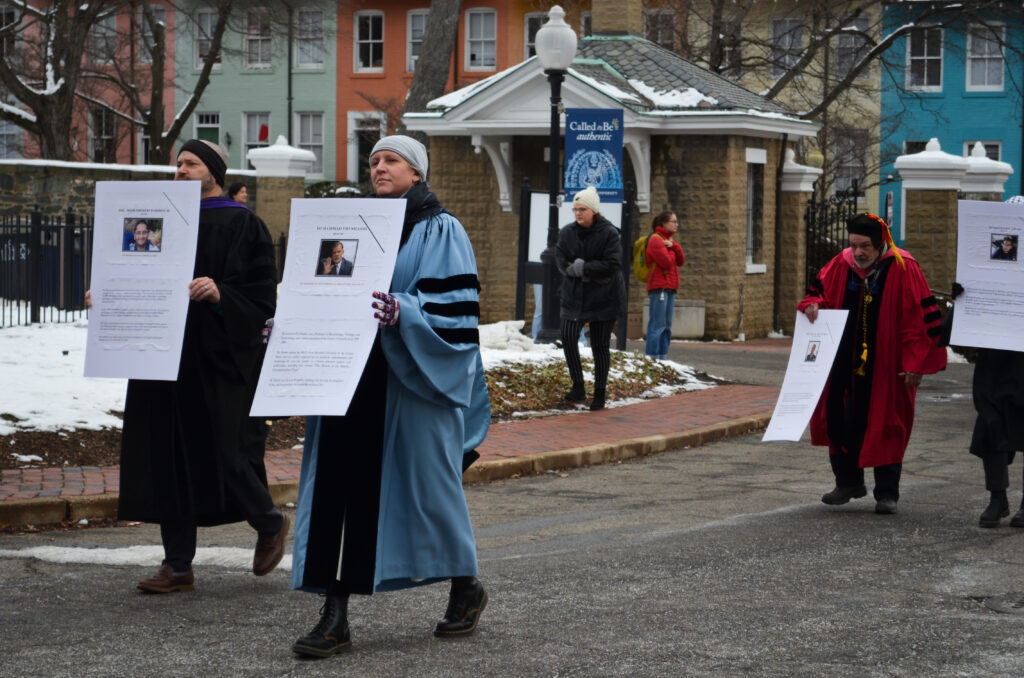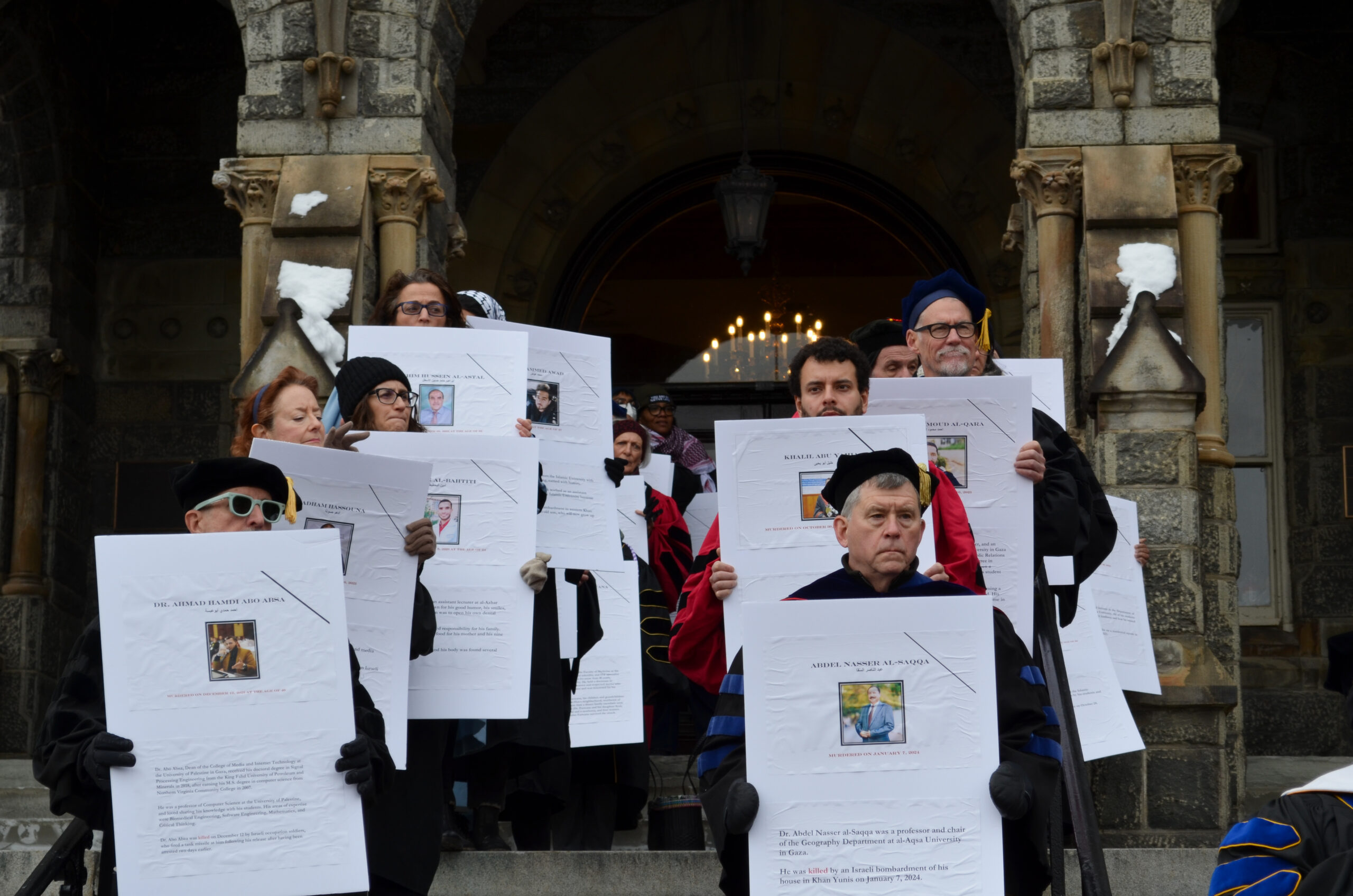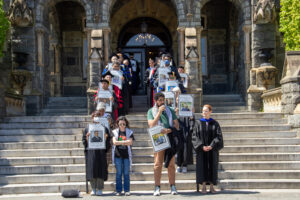Georgetown Faculty and Staff for Justice in Palestine (FSJP), a newly formed faculty and staff group to support Palestinian liberation, held a vigil Thursday afternoon to memorialize and commemorate their academic colleagues murdered in Gaza. Each faculty member held a sign about an academic who had been killed by Israeli forces, and, when prompted, read the biography before the crowd of around 100 attendees who collectively repeated each name.
Since Oct. 7 Israeli attacks have killed over 24,000 Palestinians in Gaza and nearly 500 Palestinians in the West Bank, in what U.N. experts have categorized as an ongoing genocide. FSJP highlighted the immense impact on Palestinian education in a press release before the vigil. The vigil mourned not only their academic colleagues but the more than 4,000 K-12 students, 425 undergraduate students, and 209 school staff members who have been killed by Israeli bombardment, according to fliers handed out at the vigil.
In their press release, FSJP wrote, “the wanton assault on academic institutions in Gaza is an attack on educators everywhere.” Other prominent universities such as Harvard University, Columbia University, and the University of Pennsylvania saw similar faculty groups announce themselves in the past week.
The vigil began with a moment of silence and ended with 25 chime strikes—one for each murdered Gazan academic. It also included two short poems, “If I must die” by Refaat Alareer and “I Grant You Refuge” by Hiba Abu Nada.
The Voice interviewed four faculty members, who spoke on behalf of FSJP and each expressed their motivations for organizing for Palestinian liberation. They said they felt it was their obligation to speak out, despite the backlash students and faculty have faced for doing so at many universities.
“I’m not trading my moral values for security,” Mark Lance, professor of philosophy and Justice and Peace Studies, said. “We’re paying for mass murder right now. Right? Every person in this country who pays taxes is paying for that.”
Faculty from universities around the U.S. have been suspended, disciplined, or had their events canceled for expressing support for Palestine. In mid-December, the presidents of Harvard, the University of Pennsylvania, and the Massachusetts Institute of Technology were called to testify in front of a congressional committee on antisemitism, with republican congressmen attempting to characterize pro-Palestine campus organizing as antisemitic. In the fallout of these hearings both Claudine Gay, former president of Harvard and Liz Magill, former president of Penn were forced to resign.

“I have an obligation to speak and act loudly, given the privilege I have as a tenured faculty person,” Fida Adely, director of the Center for Contemporary Arab Studies.
“A lot of people who are doing the work we’re doing are doing it from a position of privilege, and because we have that privilege, I want to use that,” Lois Wessel, associate professor at the School of Nursing and the School of Medicine, said.
Students have also often faced disciplinary measures or censorship for speaking out for Palestine. Some schools, including George Washington University, have suspended their chapters of Students for Justice in Palestine (SJP).
“There’s a lot happening on campus that might lead to a kind of self-censorship, and then people are self-censoring because of what they’re hearing is happening in the broader society, including students,” Adely said.
The group, like SJP and other related organizations, calls for an immediate ceasefire in Gaza and supports the Boycott, Divestment and Sanctions (BDS) movement and other institutional measures to end Israeli occupation and apartheid. They believe that the university has a moral imperative to contribute to boycott and divestment.
“The idea is the same as what we did in South Africa. You put pressure on corporations, who are the ones that actually put pressure on politicians to institute sanctions, to demand that adherence to international law,” Lance said.
Wessel said that the university has the ability to take action beyond calling for systemic change via public statements in favor of a ceasefire or BDS.
“I guess in addition to BDS, I feel like we need to make sure we are doing the right things to support our Palestinian and other students who are involved in this,” Wessel said.
Without proactive outreach, the faculty have noticed that their Palestinian students feel as though they have been navigating immense grief and the demands of university life by themselves.
“One of the students that approached me early on said, ‘I’m Palestinian and no one in my department has asked me if my family is okay,’” Adely said. “I met with all the assistant deans in the School of Foreign Service, where I am, and they have said that students come to them, and they’ve worked with students on a kind of case-by-case basis. But they said not many students come to them.”
Georgetown’s public response to the genocide has been minimal, the professors said, with President Degioia’s first email failing to mention Palestinian losses at all.
“It’s hard to reflect on because there hasn’t been very much,” Wessel said.
The faculty criticized the dissonance between Georgetown’s emphasis on Jesuit and Catholic values and the university’s lack of support for the Palestinian community.
“The discrepancy between what the Pope says about this conflict and what Georgetown has said about this conflict, if it claims to care and adhere to those statements, it has failed,” Sam Halabi, professor of the School of Health and the director of the Center for Transformational Health Law, said. “The president’s very first message cut off the part of the quote that said our immediate priority here should be peace in Palestine and Israel. And he just left that part about the initial aggression decontextualized. So if you really care about what you say you care about, that entire messaging should have been different.”
DeGioia’s initial email included the following quote from Pope Francis’ morning prayer on Oct. 8: “Let it be understood that terrorism and war do not lead to any resolutions, but only to the death and the suffering of so many innocent people.”
However, the email cut off the following few sentences of the prayer, which reads, “War is a defeat! Every war is a defeat. Let us pray that there be peace in Israel and in Palestine.”
“Just as we admire the contributions of our Palestinian colleagues as researchers, teachers and administrators, we now grieve their loss, and demand a ceasefire,” FSJP wrote in their release.
The group sees Jesuit values as a core part of previous efforts at reform in Georgetown policies and a strategy activists can use to force change.
“Georgetown markets itself according to these values, and at times, they’re very serious about it,” Lance said. “From the point of view of people that are trying to change things, this is a pressure point. It’s something you can say, ‘look, you’re saying these things, and we’re gonna hold you to this shit.’”
“I do believe in the power of these values. I mean, I think about the way Georgetown has dealt with its slave owning history, which of course, it would never have done without protest and pressure,” Adely said.
“We’ve been having all these conversations about diversity, about global anti-racism and how racism is also a global issue, it’s not just something that happens within our borders. Within the School of Foreign Service, we’ve been talking about building a different kind of school,” she added. “Are we going to be a school of U.S. Empire? Are we going to be a school that promotes U.S. foreign interest in the world? Or are we going to be a School of Global Studies?”
The faculty recognized that pushing Georgetown to support a ceasefire and end to the ongoing genocide in Gaza will still require significant organizing – yet they are determined to keep fighting.
“There are ways to twist their arm here and to make them do the right thing,” Lance said.
Editor’s note: This article has been updated to strike a quote.





